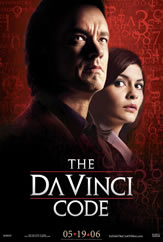

 Even before the The Da Vinci Code debuted on May 17 at the 2006 Cannes Festival, protests from Christian organizations around the world condemned it for distorting history and undermining the church.
Even before the The Da Vinci Code debuted on May 17 at the 2006 Cannes Festival, protests from Christian organizations around the world condemned it for distorting history and undermining the church.
Since they completely disagree with the contents, these people refuse to even enter the cinema, and they want to make sure no one else does either.
But a controversial novel is a best-selling one, and hard-core fans of Dan Brown are excited about the movie. They can't wait to see it. But will they enjoy it as much as the novel?
Having finished both the novel and the movie myself, I only feel disappointed and tired. When reading the novel, the fun is to decode every clue with Robert Langdon and Sophie Neveu. To look for the answers with them, remember religious trivia with them, and to discover the "truth" with them. But when the 500-page story is condensed into a two-hour movie, all the fun is sucked out. Just seconds after the proverbial light bulb flashes in Tom Hanks' brain, he knows what to do next. Watching them thinking over the riddles did not give me any thrills.
The process of decoding clues in the movie is shown as a transition between modern times and historical scenes. The big secrets and plots behind Da Vinci's works and many other masterpieces don't even appear in the movie. As a book-lover, I was busy working out the differences between the novel and the movie. How could they weaken the logical development of the story so much that I couldn't enjoy it in the cinema?
Should those who haven't read the book go see it in the theatre? They don't know the final 'truth' of the novel in advance: that Jesus Christ and Mary Magdalene married and produced a child and that the bloodline continues to the present day. Because the cast is so strong, it may deserve two hours in the cinema, I thought. So I stopped several people walking outside the cinema who had not read the novel before. Their answers were all the same; the religion was confusing, the decoding was neither suspenseful nor attractive, and the performance of the stars was standard. The movie is advertised as a combination of Hollywood commercialism and subtle plots. But it came out of the blender without any exciting visual impact or emotional depth.
Jack Valero, an Opus Dei spokesman in Britain, whose organization is likewise shown in a dark light throughout the film, has commented that The DaVinci Code "is an extraordinarily dull film. So maybe we shouldn't worry about it too much." Even an organization being negatively portrayed in the movie thinks nothing of it, so who else should watch The Da Vinci Code? That's the real question.